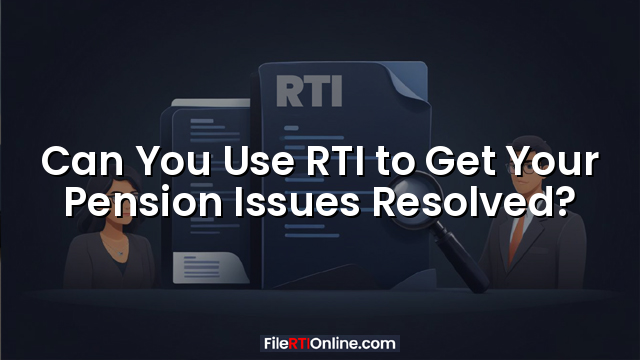Can You Use RTI to Get Your Pension Issues Resolved?
(With CIC Example on Pension Clarifications After PSU Absorption)**
Many retired government employees, ex-servicemen, and PSU employees face pension complications—especially after absorption from Armed Forces into Public Sector Undertakings (PSUs).
A common question is:
“Can I file an RTI to get my pension problem solved?”
or
“Can RTI force authorities to grant or revise my pension?”
This article explains what RTI can and cannot do, using a real case before the Central Information Commission (CIC) involving an ex-Navy officer absorbed into Bharat Electronics Limited (BEL).
What the Appellant Wanted Through RTI
An ex-Navy officer absorbed into BEL had several pension-related grievances:
- How can he be called a non-Central Government employee after 29 years in the Navy?
- Why was he deprived of PSU pension despite serving 10 years 5 months in BEL?
- How can an EPS pension of just Rs. 283 per month be considered a substitute for a PSU executive pension?
He filed an RTI seeking answers, explanations, and clarifications about pension eligibility.
Response From the Public Information Officer (PIO)
The PIO explained:
- Pension and superannuation benefits in CPSEs are governed (Department of Public Enterprises) guidelines.
- Whatever benefits are allowed to a CPSE employee are determined 2007 pay revision and related Office Memorandums.
- The PIO cannot interpret, explain, or justify pension rules.
- RTI can only provide information available on record; it cannot create explanations or redress grievances.
The First Appellate Authority advised the appellant to approach the Department of Pension & Pensioners’ Welfare for further clarification.
CIC Proceedings and What Was Revealed
During the hearing:
- The respondent explained that BEL had denied PSU pension benefits based on a letter from the Department of Pension & Pensioners’ Welfare.
- The appellant already receives pro-rata pension from the Indian Navy for his service there.
- For his BEL service, he receives pension under the Employee’s Pension Scheme (EPS), 1995.
- EPS is governed Ministry of Labour and Employment, not or DPE.
CIC’s Final Decision
The CIC held:
- The appellant was not seeking information, but asking for clarifications, interpretations, and reasons, which do not fall under Section 2(f) of the RTI Act.
- RTI cannot be used to solve pension disputes or compel a department to grant pension.
- RTI provides only the information already available with the public authority.
- Since the PIO had already given the information held on records, the appeal was rejected.
The CIC advised the appellant to pursue his pension grievance before the competent authority (Pension Department / BEL HR / Ministry concerned).
What This Case Teaches About Using RTI for Pension Issues
1. RTI Cannot Solve Pension Problems
RTI cannot:
- Order pension sanction
- Increase pension
- Interpret pension rules
- Decide which authority is responsible
- Force departments to act
It only provides documents available on record.
2. You Cannot Ask Questions, Clarifications, or “Why” Under RTI
Questions like:
- “Why was I denied pension?”
- “How can you say I am not eligible?”
- “Why is my pension so low?”
are not considered “information” under Section 2(f).
3. You Can Seek Documents Related to Your Pension
These are RTI-permissible:
- Copies of your pension sanction order
- Copies of letters related to your absorption
- Internal guidelines followed
- Correspondence between departments
- Service records used to decide pension
- Copies of any letter used to deny pension
This helps you build a strong case for a grievance or legal remedy.
4. For Actual Pension Disputes, Use the Correct Forum
To resolve pension disputes, you must approach:
- Department of Pension & Pensioners’ Welfare
- Your PSU or employer’s HR
- Ministry of Labour (for EPS matters)
- Administrative Tribunals
- High Court (if needed)
RTI helps you collect documents, but not get decisions.
Conclusion
RTI is a powerful tool to access pension-related records, but it cannot force authorities to grant or revise pension.
The CIC case clearly shows that pension grievances fall outside the scope of RTI, and applicants must raise such issues before the appropriate pension authorities.
RTI is useful for getting:
- Copies of OMs
- Service details
- Records used for pension decisions
But it cannot provide:
- Clarifications
- Explanations
- Interpretations
- Solutions to pension disputes


